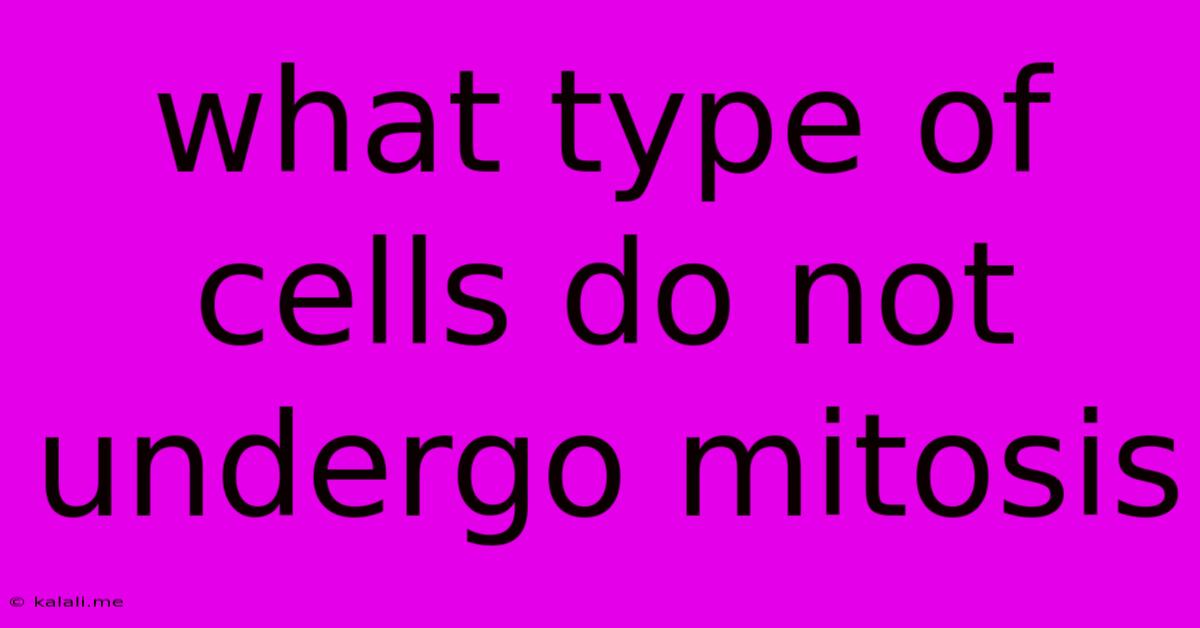What Type Of Cells Do Not Undergo Mitosis
Kalali
Jun 05, 2025 · 3 min read

Table of Contents
What Types of Cells Do Not Undergo Mitosis?
Mitosis, the process of cell division resulting in two identical daughter cells, is fundamental to the growth and repair of most organisms. However, not all cells participate in this crucial process. Understanding which cell types bypass mitosis is key to comprehending the complexities of cellular biology and organismal development. This article will explore the types of cells that do not undergo mitosis and the reasons behind this exception. The key takeaway is that the cells that don't undergo mitosis are primarily those that are highly specialized and/or terminally differentiated.
Mature nerve cells (neurons) are a prime example. These highly specialized cells are responsible for transmitting electrical signals throughout the nervous system. Once they reach maturity, they lose their ability to divide, focusing instead on their specialized function. This lack of mitotic activity contributes to the challenges in nerve regeneration after injury. While some limited neurogenesis occurs in certain brain regions, the vast majority of neurons remain in a post-mitotic state throughout an organism's lifespan. This specialization ensures efficient signal transmission but hinders repair mechanisms.
Similarly, most cardiac muscle cells (cardiomyocytes) also lose their ability to undergo mitosis after reaching maturity. This contributes to the limited regenerative capacity of the heart following injury, making heart attacks so devastating. While some research suggests a degree of cardiomyocyte proliferation under specific conditions, it's a very limited process compared to other cell types. The post-mitotic nature of cardiomyocytes protects against uncontrolled growth and maintains the precise structure crucial for coordinated heart contractions.
Skeletal muscle cells (myocytes), although possessing a greater regenerative capacity than cardiomyocytes, also exhibit limited mitosis in adulthood. Muscle growth primarily occurs through hypertrophy (increase in cell size) rather than hyperplasia (increase in cell number). This process, while effective for increasing muscle mass, highlights the restricted mitotic ability of these specialized cells.
Red blood cells (erythrocytes) are another cell type that does not undergo mitosis. These oxygen-carrying cells lose their nucleus and other organelles during maturation, effectively eliminating their ability to divide. The lack of a nucleus and cellular machinery for DNA replication and cell division is a critical feature of their specialized function, maximizing their oxygen-carrying capacity.
Finally, certain cell types are terminally differentiated, meaning they have reached their final stage of development and can no longer divide. Many cell types within the body fall into this category, including certain types of immune cells that have fully executed their function and are then eliminated from the system. The precise mechanisms regulating terminal differentiation are complex and vary across different cell lineages.
It's important to note that the inability of these cells to undergo mitosis is not a universal rule, and exceptions may exist under specific experimental conditions or in certain disease states. The reasons why these cells do not undergo mitosis are complex and often relate to their highly specialized function and the need to maintain tissue homeostasis. Further research is crucial to fully understand the regulatory mechanisms underlying mitotic arrest in these diverse cell types. This knowledge holds significant implications for regenerative medicine and the treatment of various diseases characterized by cellular dysfunction and impaired tissue repair.
Latest Posts
Latest Posts
-
How Do You Get The Ivy Role
Jun 06, 2025
-
Is The X In X Ray Capitalized
Jun 06, 2025
-
Why Did Boggs Give The Holo To Katniss
Jun 06, 2025
-
How Long Can Fish Sit Out
Jun 06, 2025
-
Civ 6 Kill A Unit With A Quadreme
Jun 06, 2025
Related Post
Thank you for visiting our website which covers about What Type Of Cells Do Not Undergo Mitosis . We hope the information provided has been useful to you. Feel free to contact us if you have any questions or need further assistance. See you next time and don't miss to bookmark.